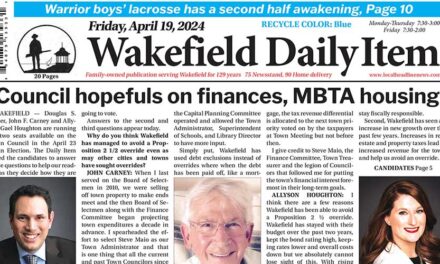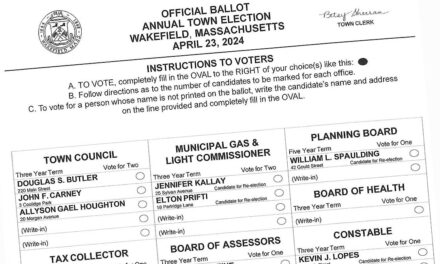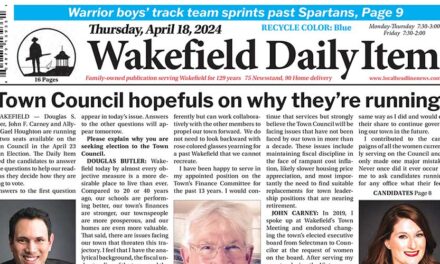Published in the October 28, 2015 edition
By MARK SARDELLA
WAKEFIELD — A zoning amendment aimed at getting a handle on homes in residential districts being used for short and long-term lodging will get one more Planning Board hearing before it heads to Town Meeting for a vote on Nov. 16.
Last night the Planning Board heard from Town Administrator Stephen P. Maio and a number of residents before continuing the hearing to its Nov. 10 meeting.
The Town Meeting article would amend the Zoning Bylaw to prohibit lodging units in single residence and general residence districts and allow the use in business districts only by Special Permit from the Zoning Board of Appeals.
Speaking on the proposed amendment, Maio told the Planning Board that the issue was brought to him by residents concerned about the phenomenon of “Airbnb” type operations in residential neighborhoods.
“We have this all over Wakefield,” Maio said, noting that if you go to the Airbnb website, you can see the listings for Wakefield homes that are advertising short-term lodging in residential neighborhoods.
Airbnb is a website for people to list, find and rent lodging. It has over 1,500,000 listings in 34,000 cities and 190 countries. Founded in August 2008 and headquartered in San Francisco, Calif., the company is privately owned and operated by Airbnb, Inc.
Maio said that the concern was that the practice was turning homes in residential neighborhoods into hotels. He said that some of the concerns included extra cars all over the street and safety issues with lodgers arriving at all hours of the day and night.
He acknowledged that there may be circumstances where the practice would be desirable but in that case the homeowner would have to get a Special Permit. He noted that the town’s zoning does allow hotels but they should not be in residential districts.
Maio stressed that the zoning change would not affect family members coming to stay with a relative or people having friends from out of town as guests in their homes. It was aimed, he said, at people running lodging operations as a business.
Maio said that there was also an issue with of homeowners in residential neighborhoods with multiple boarders in their homes that will also be addressed in the bylaw change.
Maio said that enforcement would be through the ZBA and the Building Inspector as the zoning enforcement officer.
Board members asked a number of questions about various circumstances under which a homeowner might legitimately have people staying in his home but Maio reiterated that the proposed bylaw amendment was aimed only at homeowners who run commercial short and long term lodging operations in residential districts.
“We can find a lot of ‘what ifs,’” Maio said.
Peter May of Garden Lane described a situation on his residential street. He said that a homeowner has had three full-time renters for years and recently started listing on Airbnb.
He said that the homeowner is a single man and that there are at least three built-out units attached to the house. He said that issues of having a lodging operation in a residential neighborhood include safety issues and more traffic.
But mostly, he said, it wasn’t what he had in mind when he bought a house on a residential street.
“We didn’t want to live next to the Lord Wakefield,” he said.
May said that he’s talked to the neighbor but to no avail.
“He couldn’t care less,” May said. “It’s not what our streets were meant to be.”
Planning Board member Matthew Lowry sounded a cautious note.
“For a few problem people we are changing the rules for everyone,” he said. “There should be a way to root out abuse.”
Maio pointed out that there are other things prohibited in residential neighborhoods.
“You can’t run a bakery out of your house,” he said.
Dennis Cloherty of Harvest Road acknowledged that there was a problem on Garden Lane but said that he opposed the zoning amendment.
“We don’t need more laws on the books,” Cloherty said. “That (the Garden Lane situation) can be taken care of with the laws we have.”
He maintained that there were only five Wakefield homes listed on the Airbnb website. He asserted that local Airbnb guests patronize local businesses like restaurants. He claimed that the “hotel lobby” was very active in opposing Airbnb.
“They don’t want the same thing to happen to them that happened to taxis with Uber,” Cloherty said.
Bronwyn Della-Volpe of Cyrus Street said that there would need to be clear guidelines for the ZBA to apply, asserting that the proposed amendment is too open to interpretation and too difficult to enforce.
She said that abuses should be addressed but the town should lay out what a Special Permit would entail, adding that she was looking for specifics that would weed out abuses but allow legitimate Airbnb operations.
The Planning Board continued the hearing to its Nov. 10 meeting.




